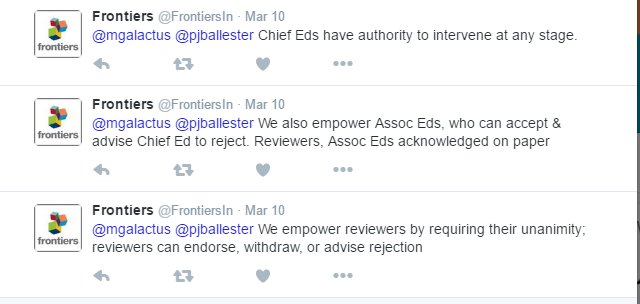The post below is a satiric parody, though the general facts and the document I publish are real and true.
On Monday, the 13th of June, Nature Publishing Group (NPG) journals shut down. Instead of high-impact papers, all the bedazzled scientific community could see was: Internal Server Error (500).
The website collapse was first noticed with the NPG journal Scientific Reports, but then spread upwards the impact factor scale to Nature Communications and even Nature itself.
What happened? The NatureNews team, begged to give any insights, remained suspiciously silent. No announcements were made, questions remained unanswered.
Nature Communication Editor-in-Chief Jörg Heber nonchalantly claimed everything was a server error.
Really? A server error? Was this event just a coincidence then:
Just before the Scientific Reports website went dark, the journal was caught having published a duplicate paper containing heavily manipulated data. Another copy of that outrageous paper appeared in Frontiers in Pharmacology (and another one in PeerJ).
Coincidence?
In fact, I will present here a wild and outlandish theory which I just now made up: Frontiers took over NPG.
The server shut-down was actually a preparation for the Open Access transformation of a kind which most would have never even thought possible: NPG journals will soon become part of the Frontiers family. As of December 23rd, 2016, the journal names will change. Scientific Reports will become Frontiers in Scientific Reports, Nature Communications will become Frontiers in Nature Communications, and Nature will become Frontiers in Nature. The Assimilation will take place on December 23rd. This day is the 41st birthday of Kamila Markram, CEO of Frontiers, which she founded together with her husband Henry.
I also will postulate here that the Assimilation of NPG into Frontiers was actually a revenge long planned and now to be executed by Henry Markram.
The reasons are clear: In fact, in 2013 Frontiers and Nature celebrated their engagement, as a part of a new big NPG family. Frontiers CEO Kamila Markram was met with open arms at the Nature head offices. Yet the happy engagement soon turned sour, Frontiers were snubbed by NPG and left standing in the rain after NPG ran away to marry Springer. After this, an editorial mutiny had to be ruthlessly squashed by the Executive Editor Frederick Fenter, who sacked all of those who ever mentioned NPG. Frontiers lost its former attractiveness, and started to let out the anger and frustration on innocent interns.
But how did Henry Markram do what I now claim he did, without any evidence?
Well, Professor Markram presides not just over the biggest research budget ever awarded to the control of one single scientist, namely the one billion Euro funded Human Brain Project. With this funding money, Marram has been able to build the most powerful computer ever known to man. It is so powerful that it makes Deep Thought look like Commodore 64.
Therefore, I assume that the fraudulent paper published simultaneously in Frontiers in Pharmacology AND Scientific Reports was a futuristic Trojan, built and released by the Human Brain Project supercomputer. Its seemingly bizarre image duplications were actually part of the code to bring about the Assimilation. By accepting the phony paper, Scientific Reports surrendered themselves and the entire NPG to Markram’s Frontiers.
Even the Twitter profile of the mighty Nature Publishing Group @npgnews was taken over, by a foreign and mysterious account:

Only some time ago this account was happily tweeting about forming a family with Frontiers!

The warnings have been there before.
Frontiers previously issued a set of guidelines to their interns on how to communicate their joining the NPG family (exclusively available here). It contained revealing statements such as:
“If you combine Frontiers innovative force with NPG’s experience and strong position in the publishing landscape, a powerful force to change the way science is communicated is formed. This partnership should signal to the world: these two organizations have now joined forces and together they will be in a better to position to serve scientists in the Internet age”.
Now, the tables have turned. The false humbleness of Frontiers becoming part of NPG must now be read as its exact opposite. For example this:
“Will Frontiers become part of NPG?
Yes, Frontiers now joins NPG but it will keep operating semi-autonomously, aligning with NPG where appropriate and joining forces in some areas and complementing NPG’s portfolio of services to scientists. […] The vision and mission of Frontiers do not change; these will, in fact, be supported by NPG”.
And of course, it will now be Frontiers owning NPG:
“Does NPG now own Frontiers?
The investment means that NPG has a majority share in Frontiers. Therefore Frontiers becomes a part of NPG, but it will be run semi-autonomously. Frontiers existing shareholders and investors continue to have a stake in the business”.
At one instance, Markrams have allowed a peek into their true plans:
“Will NPG adopt Frontiers policies, such as their interactive peer review?
There are no immediate plans to change NPG policies”.
Not immediately, but NPG will eventually adapt Frontiers editorial policies, which would in practice mean introducing the concept of unrejectable manuscripts and empower their unpaid academic editors to hand over their editorial decisions to the publisher. The process will be tightly supervised by salaried academic chief editors, whose key responsibility will be not to take any responsibility for the actual content they publish.

Again, I just made it all up. Or, maybe my predictions are true because I am psychic? Such paranormal capacities are actually very real, as Frontiers have taught us again and again. Well, maybe I just ate too much bread, despite Frontiers warnings.


Am I the only one who thought that Frontiers are a minor player. I just visited their website, they’re so arrogant, and based on what???
LikeLike
I am glad to see that my image has been widely circulated. I have modified it slightly below! I had noticed server 500 errors in fact since June 13. It is rare to see conspiracy theories in science because they are often treated as libel or just simply ignored. It is unusual to see so many NPG sites down, but not unusual for publishers to do updates and upgrades on late Sunday nights, when there is the chance of least traffic to a site.
One would think, however, given the high profile nature of NPG, that a formal public apology would be required for global shut down to access to NPG journals, including the scandal Scientific Reports case from Malaysia [1], and not just a simple Tweet!
[1]
https://forbetterscience.wordpress.com/2016/06/10/triplicated-paper-with-multiplicated-cells-and-images/
I should also note that December 23 is the birthday of Japan’s Emperor, but I am not going to introduce a second Conspiracy Theory today on the link between the Emperor and Dr. Markram. But given the crisis in Japanese academia (e.g., Haruko Obokata, Yoshitaka Fujii, and Shigeaki Kato) and the skepticism surrounding the validity of the professionalism and validity of some Frontiers’ journals mega editor boards, including their ability to conduct true peer review, a fresh set of clothes from the Emperor to Dr. Markram may be a good birthday gift for 2016.
http://imgur.com/24rZzaY
LikeLike
This is unacceptable.
Broadly, two error messages appear on the Nature Publishing Group (NPG) web-sites:
a) “Internal Server Error (500) The server encountered an internal error or misconfiguration and was unable to complete your request.”
b) “Nature.com is currently experiencing technical difficulties, please try back later.”
Most sites that are down show message a) but one site shows message b) (npj Microgravity).
And this is a horrifically embarrassing situation for Nature Publishing Group. I count 46 journals’ sites* from an estimated 144 (from A-Z menu), i.e., about 32% of the entire NPG journal fleet, which is accessible from the route menu / site index (http://www.nature.com/siteindex/index.html), that have had class 500 errors since June 13 (possibly earlier). Where I live, we are soon entering June 15, and at minimum, NPG has the responsibility of making a massive public apology if not have its CEO and SEO step forward publicly to offer a deep bow of apology to the scientific community and the public for this mega PR gaffe.
I would be surprised if nobody sues NPG for recklessness and irresponsibility, especially if we consider that scientists have paid big money to have their papers open access, but that these open access papers have in essence not been accessible.
Even if the error is temporary, for whatever reason (e.g., migrating to a new server), a sincere public apology from the highest rank of NPG management is required.
Screen-shots taken for all cases listed below, as proof:
BDJ Team
http://www.nature.com/bdjteam/
Bone Research
http://www.nature.com/boneres/
Cell Death Discovery
http://www.nature.com/cddiscovery/
Cell Discovery
http://www.nature.com/celldisc/
Horticulture Research
http://www.nature.com/hortres/
Human Genome Variation
http://www.nature.com/hgv/
Microsystems & Nanoengineering
http://www.nature.com/micronano/
Molecular Therapy — Methods & Clinical Development
http://www.nature.com/mtm/
Molecular Therapy — Oncolytics
http://www.nature.com/mto/
Nature Astronomy
http://www.nature.com/natastron/
Nature Biomedical Engineering
http://www.nature.com/natbiomedeng/
Nature Communications
http://www.nature.com/ncomms/
Nature Ecology & Evolution
http://www.nature.com/natecolevol/
Nature Energy
http://www.nature.com/nenergy/
Nature Human Behaviour
http://www.nature.com/nathumbehav/
Nature Microbiology
http://www.nature.com/nmicrobiol/
Nature Plants
http://www.nature.com/nplants/
Nature Reviews Chemistry
http://www.nature.com/natrevchem/
Nature Reviews Disease Primers
http://www.nature.com/nrdp/
Nature Reviews Materials
http://www.nature.com/natrevmats/
npj Aging and Mechanisms of Disease
http://www.nature.com/npjamd/
npj Biofilms and Microbiomes
http://www.nature.com/npjbiofilms/
npj Breast Cancer
http://www.nature.com/npjbcancer/
npj Clean Water
http://www.nature.com/npjcleanwater/
npj Climate and Atmospheric Science
http://www.nature.com/npjclimatsci/
npj Computational Materials
http://www.nature.com/npjcompumats/
npj Flexible Electronics
http://www.nature.com/npjflexelectron/
npj Genomic Medicine
http://www.nature.com/npjgenmed/
npj Materials Degradation
http://www.nature.com/npjmatdeg/
npj Microgravity
http://www.nature.com/npjmgrav/
npj Molecular Phenomics
http://www.nature.com/npjmolphen/
npj Parkinson’s Disease
http://www.nature.com/npjparkd/
npj Precision Oncology
http://www.nature.com/npjprecisiononcology/
npj Primary Care Respiratory Medicine
http://www.nature.com/npjpcrm/
npj Pollution Control
http://www.nature.com/npjpollcon/
npj Quantum Information
http://www.nature.com/npjqi/
npj Quantum Materials
http://www.nature.com/npjquantmats/
npj Regenerative Medicine
http://www.nature.com/npjregenmed/
npj Schizophrenia
http://www.nature.com/npjschz/
npj Science of Learning
http://www.nature.com/npjscilearn/
npj Systems Biology and Applications
http://www.nature.com/npjsba/
npj Vaccines
http://www.nature.com/npjvaccines/
Scientific Data
http://www.nature.com/sdata/
Scientific Reports
http://www.nature.com/srep/
Signal Transduction and Targeted Therapy
http://www.nature.com/sigtrans/
Spinal Cord Series and Cases
http://www.nature.com/scsandc/
LikeLike
How many papers has NPG being commented in PubPeer?
https://pubpeer.com/journals
How many papers from NPG have been retracted in the last years?
Is it NPG publishing science fiction?
LikeLike
Jaime, this is the number of papers questioned in a journal you refer to often: Acta Hortic. (118); one of the journals with the highest number of irregularities… What’s wrong with scientists in horticulture????
LikeLike
However, PLoS One seems to be the Champion!!! Not sure I want to submit another paper to that journal…
LikeLike
I think the numbers refer to the total number of comments: in this case journals like Nature (1754) from NPG and Cell (1249) maybe among the champions….
LikeLike
Ohhhh, good to know, it is not number of papers flagged…
LikeLike
About this here it goes an interesting opinion article by Randy Schekman, 2013 Nobel Prize:
http://www.theguardian.com/commentisfree/2013/dec/09/how-journals-nature-science-cell-damage-science
LikeLike
University of Malaya rankings going up, but based on what level of research?

LikeLike
Pingback: Governo revoga regras que restringiam bolsas de iniciação de professores | Direto da Ciência
Some additional support for this conspiracy theory:
https://tirumalaikamala.wordpress.com/2016/06/19/is-frontiers-a-non-profit-or-a-for-profit-publisher/
LikeLike
… and here 🙂 – http://www.nature.com/natureconferences/fge2017/index.html
LikeLike
Pingback: Frontiers: a danger for public health? – For Better Science